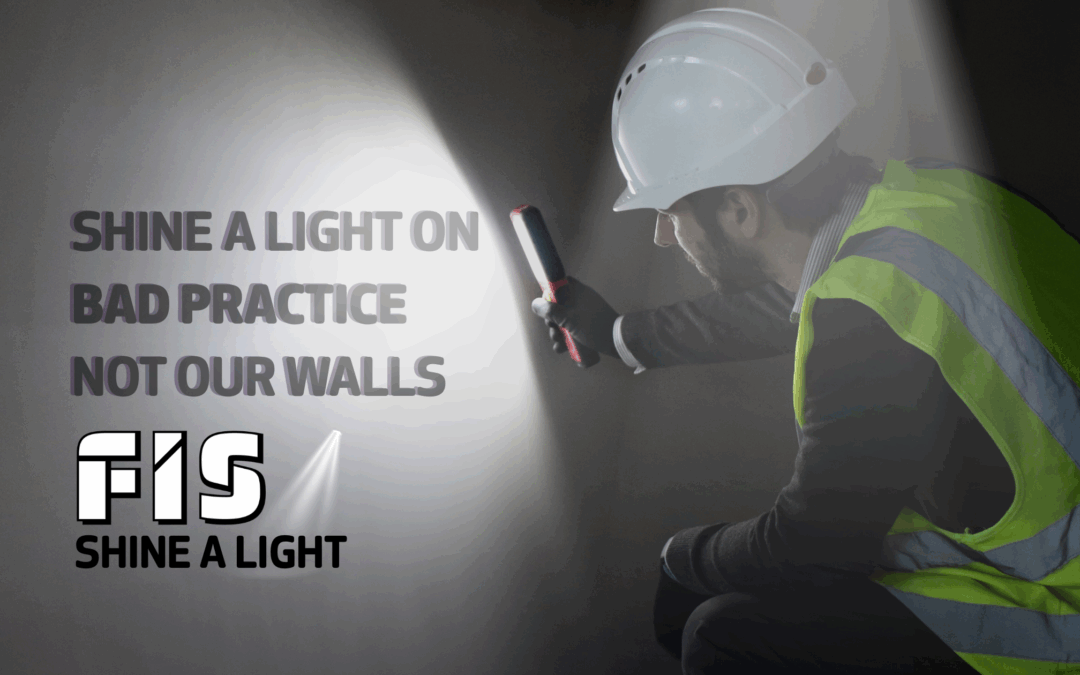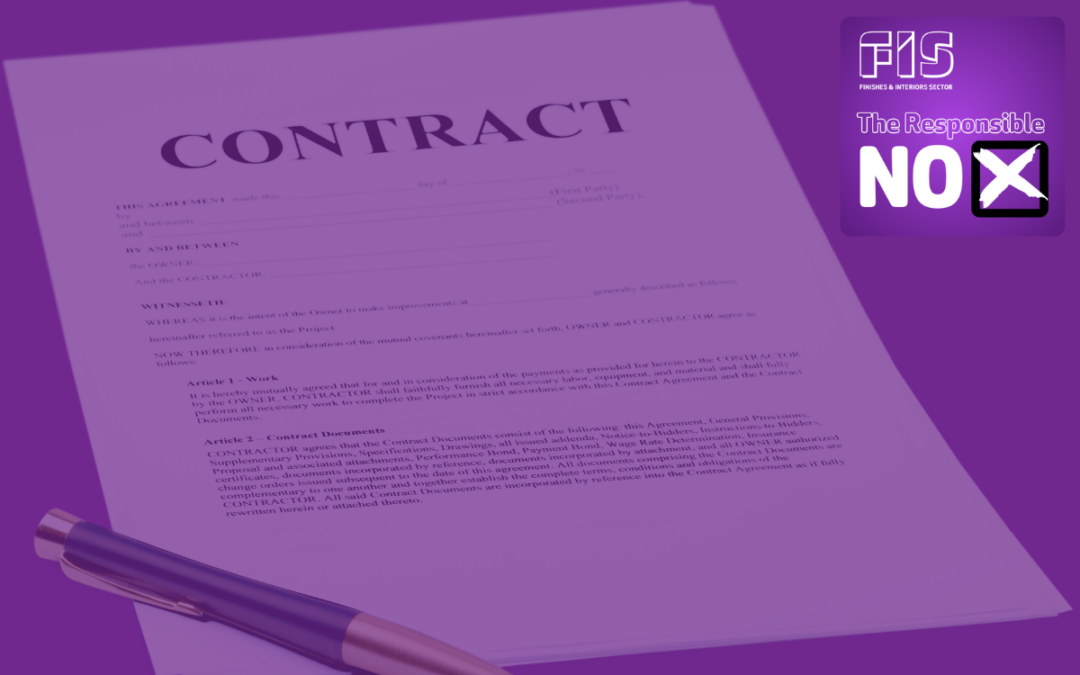
by Oscar Venus | 20 Jun, 2025 | Contractual and Legal, Drylining, Insurance
Finishes and Interiors Sector (FIS) is taking a stand against poor behaviour in the supply chain. Members working in the housebuilding sector have raised concerns about unfair snagging practices on plaster or tape and jointed walls where LED lights are being used at shallow angles to inspect the finish.
This improper practice whereby the light is shined close to, or directly against the surface of the wall, highlights surface imperfections which are normally imperceptible to the human eye well within tolerance when industry-standard inspection methods are used.
On launching the campaign, Iain McIlwee, FIS Chief Executive stated: “We often talk about the culture of construction and that means we need to look at all behaviours and the effect they have. It is clear to us that this over-zealous approach to inspection is creating a lot of bad feeling and straining relationships. Our belief is that the practice has little to do with quality and everything to do with keeping pressure on the supply chain, making sure sub-contractors are operating under commercial tension. In the worst of cases it is being used to delay, reduce or withhold payment and with that all the cashflow and mental health issues that plague SMEs in the supply chain. Sometimes problems can be put down to people not understanding the standards and techniques, but in reality, it is often little more than bullying behaviours and has no place in the sector today.”
To tackle the problem head-on, FIS has published new guidance which members are encouraged to download and share with their clients ahead of starting work. This guidance covers how inspections should be conducted and encourages the classification of the flatness of the plastered finish is agreed along with the level of smooth finishes before work starts.
FIS Head of Technical James Parlour said: “Over the years we’ve tried attacking this problem from purely a technical perspective, but frustratingly people continue to ignore the standards. Change won’t happen unless we put our heads above the parapet and start to call out bad behaviour. This latest guidance and supporting resources should help align expectations and inspections to the standards and ensure that we avoid glancing light issues in inspection which exaggerate even the smallest of imperfections.
We do appreciate that it can be difficult for individual members to do this directly, but we are also asking members to report to us when they encounter these bad practices and we can pick it up as a collective effort.
So the message is clear, if you are inspecting drylining and plaster finishes, refer to the standards and ensure that your processes are informed, fair and realistic. If you are a specialist contractor and have experienced unfair snagging practices, don’t just put up with it and move on reach out to us in confidence so we can log cases and start to challenge businesses to improve”.
Beyond site tension FIS is also concerned the effect bad practices have on those looking to start a career in the sector. Young people are being encouraged into the industry but when they are faced with this culture and ruthless nature many leave before they have had chance to really see what a good career the construction industry can offer. We need to create a better culture on site to attract and retain the people we need.
To support the campaign FIS will be launching a short video to help showcase the problem and is develop new training to support inspections. You can register on the FIS website to receive free access to the training when it is launched later this summer.
For more information and to keep an eye on developments visit the FIS Shine a Light Campaign page here.
To report your experiences, email details in confidence to info@thefis.org or call 0121 707 0077.

by Clair Mooney | 9 Jan, 2025 | Building Safety Act, Contractual and Legal, Insurance
Establishing clear contractual arrangements from the outset of any construction project is critical. This is a core conclusion from virtually every review of the construction sector. As far back as 1866, The General Builders Association put out the following statement:
“It is not right to bring under the builder’s consideration legal conditions, the effect and value of which he cannot rightly estimate without consulting it’s solicitor”.
JCT was established nearly 100 years ago to address concerns and help create a standard set of terms. These contracts address the complexity of multi-tier supply chains, mutually dependent relationships and different parties joining the contractual chain at different times. Other standard form contracts, such as NEC, are now commonplace. Yet recent research from Reading University into Procurement and Contracting Practices in the Finishes and Interiors Sector highlight that 64% of businesses in the supply chain regularly start a project without a contract in hand and the norm is to work on amendments that effectively bespoke relationships and seek to pass down unreasonable amounts of risk.
It is this culture that the Duty Holder Regime (now enshrined in the Building Regulations) seeks to address and puts under additional scrutiny attempts to shift risk through contract. This change to law potentially resets legal precedence for passing down risk. Significantly too, recent advice from the Construction Leadership Council (CLC) should not be dismissed as a token effort to restate the problem. The Grenfell Inquiry made clear the risks in the following finding:
“Studio E (Architect), Rydon (Main Contractor) and Harley (Cladding Specialist) all took a casual approach to contractual relations. They did not properly understand the nature and scope of the obligations they had undertaken, or, if they did, paid scant attention to them.
They failed to identify their own responsibilities for important aspects of the design and in each case assumed that someone else was responsible for matters affecting fire safety. Everyone involved in the choice of the materials to be used in the external wall thought that responsibility for their suitability and safety lay with someone else.”
In a rare open Statement, the CLC highlights another serious concern that all in the supply chain (particularly clients) need to be alert to:
“Many Professional Indemnity Insurance policies only cover claims for contractual liabilities to the extent that those liabilities would exist in the absence of the contract. … Clients have no control over whether contracting parties can secure PII cover that will respond when the client suffers a loss and wants to recover that loss.”
In plain terms CLC has made it clear:
“if a client seeks to claim for loss or damage, it cannot be relied upon that it will be settled by the PII insurers, and the consultant/contractor potentially faces financial ruin, and the client left with a claim that cannot be recovered.”
To help members bring these points together, improve understanding of where and how template contracts can and should be amended, highlight areas of particular concern and support negotiations with clients FIS has produced a new Using Standard Form Contracts. This has been made available to FIS Members through the Contractual and Legal Toolkit and has been designed to support the Responsible No Campaign.
Blog post written by Iain McIlwee to launch new FIS Factsheet: Using Standard Form Contracts.

by Oscar Venus | 30 Oct, 2024 | Insurance, Lens Blog
What an absolute rollercoaster the construction industry in the United Kingdom has experienced in the last 4 to 6 weeks, and I want to talk about some of the issues that I see that have emerged, and to consider what may happen in the future.
The background of course has been the demise of ISG Construction Ltd in administration in the latter part of September 2025 and the Administrators have published a Statement of Affairs which makes absolutely grim reading with the supply chain being owed significant sums of money and they are not likely to receive anything. In my next Blog I may be able to update readers on what has emerged but as at 26 October 2024 it is not clear how some of these major projects will be recommenced and completed and what the impact will be on the supply chain.
In the past few days, we have seen the fallout of two subcontractors also going into administration as a result of the amounts of money that they were owed. As to whether or not there were other issues affecting these organisations, remains to be seen.

by Oscar Venus | 14 Dec, 2023 | Contractual and Legal, Insurance
With cashflow continuing to be a thorny issue across the industry, it’s never been more important to ensure your payment preparations are in good health. Here, our expert elf delivers a dozen festive financial pointers to help prepare your business balance sheet for the New Year and beyond…
Unfortunately we’re still seeing significant contractor and sub-contractor business failures across the UK, resulting in a trail of devastation for the supply chain.
I’ve recently dealt with payment and cashflow issues for a number of SMEs and the level of difficulties currently being experienced is extraordinary.
After 40 years in the industry I don’t think I’ve ever seen so much chaos and it’s desperately sad to see so many businesses going into administration and good people being made redundant.
It’s essential that FIS Members minimise risk in 2024, so with apologies to the classic tune <<The 12 Days of Christmas>>, I’ve wrapped up a dozen of my own top payment tips to ensure you don’t lose sleep over payments and can enjoy a silent night…
1. Use Mr (or Mrs) Clause – use an experienced professional to analyse any contracts you’re bidding for and highlight any high-risk clauses. This will allow you to discuss the issue in advance and request that the clauses are removed or mitigated. There’s no use doing this after your tender has been accepted!
2. Make a list and check it twice – ensure you have a payment schedule in your contract, setting out the dates when you’ll make an application for payment, what you need to provide, the due and final dates for payment and when a pay less notice will be issued. Stick religiously to these dates – your commercial manager should have them in their calendar.
3. Stay another day – beware your payment schedule running out. If a job runs past the last date in the schedule, make sure it’s extended until you reach practical completion.
4. Talk turkey – payment applications are often rejected or reduced because you haven’t provided the relevant information. Too much detail is better than not enough, so ensure your commercial manager follows up each application with a call to the contractor to establish they have everything they need. There’s nothing worse than getting to the end of the month, only to find your application has been shredded!
5. Follow the star – make sure you do what the contract says about submitting notices. So if it says they must be sent by email and registered post, do that. If it says they have to go to individuals and an organisation, do that instead.
6. Wrap it up – a sub-contractor told me recently that if his money isn’t received by the final date for payment, he issues a notice to suspend the performance of his obligations on site the next day. You’re perfectly entitled to do this and I find it’s a good wake-up call to both contractors and employers.
7. Do you hear what I hear? – you’ll often get an early indicator if there are trading difficulties, so keep your eyes and ears open. If the contractor or employer isn’t paying on time or reducing payments, share intelligence and compare notes with other sub-contractors.
8. Avoid a ding-dong – if you’re delayed, tell the contractor or employer why ASAP and give early notification of an extension of time. Some clients say they don’t want to ruffle feathers, but your priority is your <<OWN>> business. A standard contract allows extensions of time and payment of loss and expense, so take advantage.
9. Head for quality street – quality is still a major issue in the industry, with clients being charged for failing to rectify defective workmanship, remove rubbish and comply with health and safety regulations. The Construction Quality Improvement Collaborative is a major step forward – it’s worth signing up at www.cqic.org.uk to demonstrate your credentials and commitment to doing things right.
10. Jingle all the way – I recently issued a notice of adjudication to a defaulting party who quickly paid up. The Low Value Dispute Adjudication offers a fixed fee for an adjudicator to run such a dispute so you should take advantage – find out more at www.rics.org
11. Goodwill to all men – SELECT is among the many bodies to sign up to the Conflict Avoidance Process (CAP), which you can use as an early intervention to prevent issues escalating and allow you to keep working (and earning). Check it out at www.rics.org/capledge
12. Stuff those turkeys – finally, if you’re working with an organisation that’s repeatedly giving you the runaround, have the courage to tell them their goose is cooked and give them the boot.
In addition to these pointers, please read the CICV’s Best Practice Guide – available to download for free from www.cicvforum.co.uk – to improve your commercial management.
There’s no doubt we’re in for another tough 12 months across the industry but those firms that prepare properly will manage to weather the snowstorms to come.

by Clair Mooney | 6 Oct, 2022 | Insurance
To help manage risk and provide additional support to its members on insurance matters,FIS has partnered with specialist insurance consultants Construction Shield and AWL Homeproof Limited.
This new service will enable members to test the effectiveness of existing cover and secure an alternative quote. It will also open-up exclusive access to specialist insurance products at highly competitive prices. Members will be supported with Professional Indemnity, Contractors All Risk, Commercial Combined Business Insurance, Directors and Officers Insurance, Motor, Performance Bonds and a range of other relevant specialist insurance products.
FIS is focused on compliance and improved risk management in the finishes and interiors sector. In the past couple of years members have increasingly raised concerns related to rising insurance premiums, reduced cover, onerous endorsements and at times the inability to gain access to the correct cover.
The aim of this new service is to leverage the collective power of its membership to create greater awareness of the risks faced in our sectors and enable meaningful research and development to be carried out, driven from claims and risk data for our members.
This new partnership will support the development of a deeper understanding of claims, how risk is being assessed and to develop different and a more progressive relationship with the insurance sector, one that offers a truly bespoke service whilst also allowing for greater access to insurance products at improved pricing structures.
Commenting on the scheme, FIS CEO Iain McIlwee said:
“The insurance market has hardened significantly in recent years and created a real challenge for members in large parts of our market. This new relationship is structured to help us to better understand and attack this problem and work better as a community.
Our mission is all about building an effective compliance environment and reducing risk for members. Understanding the scope and causes of any claim is key to this, as is establishing a closer working link with the insurance sector to help manage out the causes of claims. We see this as very much a first step in terms of developing a healthier insurance umbrella for our community and focusing our technical and commercial services on reducing risk.”
Mark Potter from Construction Shield added:
“We are enjoying working with FIS who have shown themselves to be a progressive and innovative trade body and very dedicated to the needs of their community. We look forward to working more closely with this community and better understanding pricing and helping to manage risk and also present a healthy and attractive sector to the insurance world. This is something we see progressing over the next few years and we have some exciting ideas around creating a captive and possibly one day a mutual solution that could serve this sector”
The service was officially launhed at the FIS AGM and Regional Conference on 6 October in London.
To obtain a quote, members need to contact Construction Shield on 0121 726 5130 at least 6 weeks prior to their renewal date. They will ask you to provide the schedule from last year’s policy and any details that may have changed or evolved in your business. Construction Shield and AWL Homeproof will aim to secure the best possible price for you.

by Clair Mooney | 8 Sep, 2022 | Building Safety Act, Insurance
Projects to tackle fire safety risks on high-rise residential buildings have been boosted by the publication of a new model insurance clause covering fire safety risks. The wording has been developed by the International Underwriting Association (IUA) and the Department for Levelling Up, Housing and Communities for use in work being completed under the government’s £4.5bn Building Safety Fund. It will help speed up the removal of unsafe cladding, encourage a greater safety culture within the construction industry and provide insurers with increased confidence in risk management processes employed by the construction sector.
The model clause is freely available for use by underwriters looking to provide professional indemnity insurance for building cladding remediation work. The Building Safety Fund was introduced in order to cover the cost of such refurbishment work on high rise residential blocks over 18m.
Levelling up Secretary, Greg Clarke said: “Our priority is making sure people’s homes are safe and that safety standards are high.
“Alongside our tough new regulatory regime, this new clause that has been developed with my department will help us do just that.
“We welcome the work of the IUA and the underwriters who are taking a proportionate approach to fire safety cover and I thank insurers in advance for using it.”
Chris Jones, IUA Director of Legal and Market Services, said:
“Our new model clause sets out a number of key risk management processes that will ensure work being carried out is conducted within recognised industry standards. This will help improve accountability for safety measures and foster an investment in quality construction.
“The market for construction professional indemnity insurance has been difficult in recent years, reflecting concerns about the potential for historic liabilities to develop into future claims following the Grenfell Tower tragedy. Each new risk must continue to be assessed on a risk-by-risk basis, of course, but the clause should provide underwriters with greater confidence to offer effective insurance solutions for future work.”
A survey of IUA members in September last year revealed a cautious willingness amongst IUA members to underwrite fire safety risks on new projects to remove defective cladding from high rises. Around two thirds of respondents stated they would provide a limited form of cover, whilst a further 4% were happy to offer unrestricted protection.
The poll was carried out by the IUA’s Construction Professional Lines Working Group which was established in 2019 to encourage greater engagement between insurers, government, regulators and construction firms.
Copies of the IUA Building Safety Fund Cladding and Fire Safety Limited Exclusion and Aggregation Clause are freely available to download at https://www.iua.co.uk/IUA_Member/Press/Press_Releases_2022/IUA_publishes_new_fire_safety_clause_for_high_rise_repairs.aspx
Any questions or comments related to this clause should be fed to Iain McIlwee, (iainmcilwee@thefis.org) who is representing the FIS Community on the Construction Leadership Council’s Insurance Working Group


















